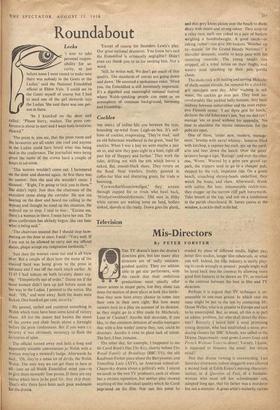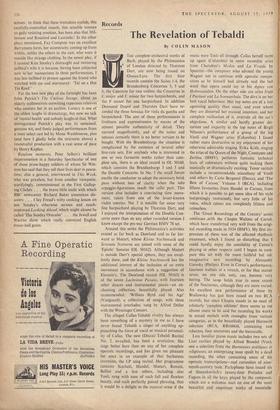Television
Mis-Directors
By PETER F 0 R'S T E R THE TV drama's laws the drama's directors give, but too many play Qlqr E directors are of sadly utidistin- guished quality. They are seldom able to get star performers, with 40 the result that their ambitious 0 0 productions must usually offer minor actors in major parts, but they alone can dress the mutton of poor plays to look like lamb : thus they now have every chance to come into their own in their own right. But how many viewers turn to a play on account of its director, as they might go to a film made by Hitchcock, Lean or Clouzot? Ascribe dull direction, if you like, to that common delusion of studio managers that with a few weeks' course they, too, could be directors. Ascribe it even to plain lack of talent. The fact, I fear, remains.
The other day, for example, I happened to see Sir Carol Reed's film The Key, shortly before The Royal Family of Broadway (BBC-TV), the old Kaufman-Ferber piece about the Barrymores, and Travelling Lady (ATV), an American school-of- Chayevsky drama about a jailbird's wife. 1 intend no insult to the two TV producers, each of whom has a certain reputation, but neither play showed anything of that individual quality which Sir Carol imprinted on his film. Nor can this point be evaded by pleas of different media, higher pay, better film studios, longer film rehearsals, or what you will. Indeed, the filkin industry is surely play- ing its cards wrongly at present : people might well be lured back into the cinemas by allowing more good first-features to be shown on TV, so marked is the contrast between the best in film and TV direction.
Perhaps it is argued that 'TV technique is un- amenable to one-man genius. In which case the issue might be put to, the test by contacting Mr. Orson Welles, who is at present in Europe and said to be unoccupied. But, as usual, all this is in part an admin. problem, for who shall direct the 'direc- tors? Recently I heard how a most promising young director, who had established a name pro- ducing classics for BBC Schools, was called to the Drama Department—and given Lovers Leap and French Without Tears to direct ! Variety, I know, is supposed to broaden the mind : but whose mind?
Not that drama ' viewing is unrewarding. Last Saturday afternoon, indoor sluggards were allowed a second look at Edith Evans's moving character- isation; in A Question of Fact, of a business- woman who must tell her schoolmaster son, adopted long ago, that his father was a murderer but not.a monster. A great artist's maturity carries echoes : to think that these tremulous eyelids, this carefully-controlled mouth, this sensible woman SD gaily resisting emotion, has been also that Mil- 1 kmant and Rosalind and Laureola! In the other plays mentioned, Fay Compton was on excellent Barrymore form, her eccentricity coming up from within, unlike the others in the cast, who wore it outside like strange clothing. In the newer play, if resisted Kim Stanley's distraught and twittering jailbird's wife it is because, having been subjected now to her mannerisms in three performances, I was less inclined to protest against the friend who watched with me and murmured : 'Tat on a Hot Tin Roof.'
Far the best new 'play of the fortnight has been John Patrick's The Curious Savage, about an elderly millionairess outwitting rapacious relatives who immure her in an asylum. Lunacy is one of the oldest laughs in dramaturgy, but now we talk of 'mental health' and nobody laughs at that. What distinguished Patrick's play was its sustained, genuine wit, and finely judged performances from a most select cast led by Mona Washbourne, plus (and here I gladly belie the strictures above) a resourceful production with a real sense of pace by Henry Kaplan.
Random moments. Peter Sellers's brilliant impersonation in a Saturday Spectacular of one of those prose-happy soldiers of whom Sir Win- ston has said that they sell their lives dear in peace- time; also a general, interviewed in This Week, who was priceless, but from another viewpoint, scarifyingly, commissioned in the First Gallop- ing Cliches . . . the brave little smile with which BBC newscaster Richard Baker announces dis- asters . . . Clay Freud's witty cooking lesson on last Sunday's otherwise serious and much- nproved Looking Ahead, which might almost be called 'The Sunday Oracular' . . . the Jewell and Warriss show which really conveyed English music-hall gusto.































 Previous page
Previous page